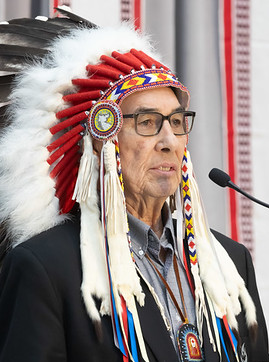Willie Littlechild facts for kids
Quick facts for kids
Willie Littlechild
|
|
|---|---|

Littlechild in 2024
|
|
| Member of Parliament for Wetaskiwin |
|
| In office 1988–1993 |
|
| Preceded by | Stanley K. Schellenberger |
| Succeeded by | Dale Johnston |
| Personal details | |
| Born |
J. Wilton Littlechild
1 April 1944 Hobbema, Alberta, Canada |
| Political party | Progressive Conservative Party of Canada |
| Spouse | Helen Peacock |
| Children |
|
| Alma mater | University of Alberta |
| Signature | |
Willie Littlechild (born in 1944) is a respected Canadian lawyer and a leader of the Cree people. He was once the Grand Chief of the Confederacy of Treaty Six First Nations. He also served as a Member of Parliament, which means he helped make laws for Canada.
Willie Littlechild is a survivor of the residential school system. These schools caused a lot of harm to Indigenous children. He is well-known for his important work, both in Canada and around the world, to protect and promote the rights of Indigenous peoples. He was born in Hobbema, Alberta, which is now called Maskwacis.
Contents
Early Life and Education
Growing Up and Residential School
Wilton Littlechild was born on April 1, 1944, in Hobbema, Alberta. When he was six years old, he was sent to a residential school. He stayed in this system for 14 years, until he finished high school. During his time there, he saw and experienced many unfair and harmful things.
A Talented Athlete and Student
As a young person, Willie Littlechild was a very good athlete. He won ten "Athlete of the Year" awards! He earned a Bachelor of Physical Education degree in 1967. Later, in 1975, he received a master's degree in physical education from the University of Alberta. While at university, he played on both the hockey and swimming teams.
Becoming a Lawyer and Chief
In 1976, he made history by becoming the first status Indian from Alberta to earn a law degree. He also got this degree from the University of Alberta. That same year, the Cree Nations honored him with a special headdress. They also gave him his grandfather's Cree name, Mahihgan Pimoteyw, which means "Walking Wolf."
Career and Achievements
Working for Indigenous Rights
Willie Littlechild was part of an Indigenous group that went to the United Nations in 1977. He worked on the UN's important Declaration on the Rights of Indigenous Peoples. This declaration helps protect the rights of Indigenous people worldwide.
He won the national Tom Longboat Award twice, in 1967 and 1974, for his athletic achievements. He also helped start the North American Indigenous Games in 1990. These games are a big event for Indigenous athletes. He has also strongly supported creating the World Indigenous Games. This event would bring together Indigenous athletes from all over the globe.
Serving in Parliament
From 1988 to 1993, Willie Littlechild was a Progressive Conservative Member of Parliament for Wetaskiwin. This meant he represented the people of that area in the Canadian government. After leaving Parliament, he continued to be involved in politics and advocacy. He founded the International Organization of Indigenous Resource Development. This group works with the United Nations to help Indigenous communities.
Community and National Recognition
Willie Littlechild is a member of the Ermineskin Cree Nation. The Indian Association of Alberta gives out the "Willie Littlechild Achievement Award" every year. This award goes to six First Nations students.
In 1998, he was made a member of the Order of Canada, which is one of the highest honors in the country. In 2023, he was promoted to the rank of Companion of the Order of Canada. In 2006, he received the Distinguished Service Award. This award recognized his great work in promoting Canada's parliamentary system.
Truth and Reconciliation Commission
In 2009, Willie Littlechild was chosen to be a commissioner for the Truth and Reconciliation Commission of Canada. He worked on this important commission for six years. The commission's goal was to learn and share the truth about residential schools. It also aimed to help with healing and reconciliation. For his work on the commission, he received the Meritorious Service Cross in 2017.
Recent Honors and Contributions
In 2015, Willie Littlechild received the Indspire Award for his work in law and justice. On November 30, 2016, he became the Grand Chief of the Confederacy of Treaty Six First Nations. He was the first person to hold this position who was not a "sitting" chief. He served for three years.
In 2018, he was given the Order of Sport. This honor meant he was inducted into Canada's Sports Hall of Fame. In 2019, Willie Littlechild won the Pearson Peace Medal. This medal is given to people who have made great efforts for peace. During Pope Francis' visit to Canada in 2022, Willie Littlechild gave the Pope a traditional Indian headdress. This moment led to different reactions from the Indigenous community.

